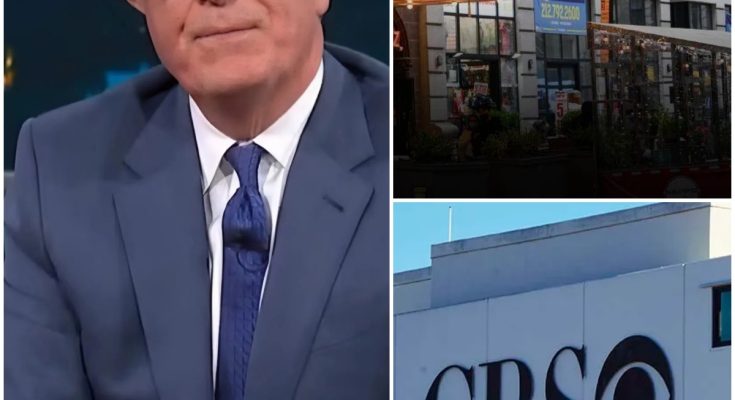It started with a whisper—a cryptic tweet, a flashy headline, a viral TikTok video. “Stephen Colbert Prepares EXPLOSIVE Move to CNN After CBS Cancels The Late Show Amid DARK INTERNAL WAR and Secret Payoffs.” The words blazed across social media, gathering speed and intensity with each repost and retweet. Within hours, a digital wildfire was raging: had CBS really canceled The Late Show? Was Colbert about to blow the whistle on years of corporate corruption and censorship? Was late-night TV on the brink of a historic shakeup?
For millions of Americans who wind down their days with Colbert’s signature blend of wit, satire, and political commentary, the rumors felt both shocking and strangely plausible. After all, the world of television—especially late-night TV—has always been a battleground of egos, contracts, and shifting allegiances. But as the story spiraled, one question loomed above all: what was true, and what was just another viral illusion?
The Anatomy of a Rumor: How the Story Spread
To understand how a single rumor about Stephen Colbert could take on a life of its own, you have to look at the modern media ecosystem. In an era where social media platforms reward speed and sensationalism over accuracy, stories can leap from obscurity to ubiquity in minutes. All it takes is a few suggestive posts, a handful of AI-generated images, and a public primed for drama.
The Colbert story had all the right ingredients: a beloved TV host, a shadowy “internal war,” hints of secret payoffs, and the promise of an explosive tell-all. For digital content farms and clickbait sites, it was a goldmine. Articles with breathless headlines began circulating: “Colbert Strikes Back!” “CBS Silences Its Star!” “CNN’s Secret Deal Revealed!” Each new iteration added a fresh twist, blurring the line between fact and fiction.
But beneath the noise, something else was happening—a collective yearning for the kind of behind-the-scenes intrigue that has always defined the mythology of show business. In a way, the rumors said as much about us, the audience, as they did about Colbert or CBS.
The Real Stephen Colbert: From Satirical Newsman to Late Night Institution
Before diving into the truth behind the headlines, it’s worth remembering who Stephen Colbert really is—and why his fate matters to so many.
Born in South Carolina, Colbert first rose to fame as a correspondent on Comedy Central’s “The Daily Show with Jon Stewart,” where he perfected the art of satirical news. In 2005, he launched “The Colbert Report,” playing a bombastic, right-wing pundit who skewered media hypocrisy with razor-sharp wit. The show became a cultural phenomenon, winning Emmys and spawning iconic moments like the White House Correspondents’ Dinner speech that left President George W. Bush squirming.
When David Letterman retired in 2015, CBS tapped Colbert to take over “The Late Show.” At first, some wondered if his brand of satire would translate to the broader, more mainstream audience of network television. But Colbert quickly found his stride, especially in the Trump era, blending comedy, political commentary, and heartfelt interviews into a nightly ritual for millions.
By 2025, Colbert was not just a host—he was an institution, a trusted voice in a fractured media landscape. Which is why the rumors of his departure hit so hard.
“I Won’t Let Them Bury the Truth Just Because It’s Messy”: The Viral Quote
One of the most dramatic elements of the rumor mill was a supposed quote from Colbert himself: “I won’t let them bury the truth just because it’s messy.” The line was repeated across dozens of articles and social media posts, often paired with claims that Colbert was preparing to “name names” and expose years of CBS censorship.
But did Colbert really say it? A search of reputable news outlets, transcripts, and Colbert’s own social media turned up nothing. The quote, like so many viral soundbites, appeared to be a fabrication—an invention designed to add fuel to the fire.
This is a classic tactic in digital misinformation: put dramatic words in a celebrity’s mouth, and watch engagement soar. The problem, of course, is that the more a quote is repeated, the more “real” it feels—even if it never actually happened.
The Truth About The Late Show: Still On, Still Colbert
Amid the swirl of speculation, the facts are remarkably mundane. As of August 2025, there is no official announcement from CBS, Colbert, or any credible news outlet that The Late Show has been canceled. The show remains a cornerstone of CBS’s late-night lineup, regularly drawing millions of viewers and high-profile guests.
Nor is there any evidence of a “secret deal” with CNN. While networks sometimes poach talent from one another, such moves are typically preceded by months of negotiation, leaks to the press, and official statements. In Colbert’s case, there has been nothing—no hint from Variety, The Hollywood Reporter, Deadline, or even CNN itself.
So why did so many people believe otherwise?
The Allure of Scandal: Why We Love a Good Media Meltdown
Part of the answer lies in our collective fascination with media scandals. From the days of Johnny Carson’s feuds to the Conan O’Brien–Jay Leno “Tonight Show” wars, late-night TV has always been a stage for backstage drama. We love to imagine the power struggles, the secret meetings, the whispered betrayals.
In a fragmented media landscape, these stories offer a sense of continuity—a reminder that, behind the carefully curated images, real people are fighting for relevance, control, and survival. The Colbert rumors tapped into this primal narrative, offering a glimpse of chaos behind the curtain.
But there’s another, darker reason why such stories thrive: mistrust. In an age of corporate consolidation, political polarization, and endless spin, audiences are primed to believe that the “real story” is always being hidden. The idea that Colbert—a comedian known for skewering hypocrisy—might be fighting a lonely battle against corporate censors felt plausible, even heroic.
The Machinery of Misinformation: How Fake News Goes Viral
The Colbert saga is also a case study in how misinformation spreads online. Here’s how it works:
A Sensational Claim Appears:
-
- Often on a low-credibility site or social media account, using dramatic language and unverified “insider sources.”
AI and Clickbait Amplify the Message:
-
- Automated content generators and clickbait farms churn out dozens of articles, each tweaking the story for maximum engagement.
Social Media Supercharges the Spread:
-
- Users share, retweet, and comment, sometimes adding their own spin or “evidence.”
Mainstream Confusion:
-
- As the story picks up steam, even reputable outlets may feel pressure to “cover” the rumor, lending it a veneer of legitimacy.
The Truth Struggles to Catch Up:
- By the time fact-checkers weigh in, the narrative has already taken hold.
In the Colbert case, the cycle was turbocharged by his fame and the public’s appetite for media intrigue. But the underlying mechanics are the same ones that drive political disinformation, health hoaxes, and conspiracy theories.
Colbert’s Real Relationship with CBS: Satire, Critique, and Survival
To be clear, it’s not as if Colbert has never criticized CBS or the broader media landscape. As a satirist, he regularly pokes fun at his own network, at corporate culture, and at the absurdities of television. He’s joked about censorship, budget cuts, and executive meddling—sometimes with biting accuracy.
But these moments are part of a long tradition in late-night TV, where hosts use humor to address real tensions while maintaining plausible deniability. Johnny Carson did it. David Letterman did it. Even Jimmy Kimmel and Seth Meyers do it today.
What’s remarkable about Colbert is how deftly he walks the line—challenging power without burning bridges, critiquing his own industry while remaining one of its biggest stars. If there were a genuine “internal war” at CBS, it’s unlikely Colbert would be the first to leak it to the tabloids.
The Business of Late Night: Why Networks Hold On to Their Stars
There’s also a simple financial reality: late-night hosts are incredibly valuable to their networks. They draw loyal audiences, attract advertisers, and generate buzz far beyond their time slots. For CBS, Colbert is not just a host—he’s a brand, a revenue stream, and a key part of their public image.
Canceling The Late Show would be a seismic move, one that would require months of planning and likely cost the network millions. If such a decision were made, it would not be kept secret for long. The same goes for a move to CNN, which would require complex negotiations and public announcements.
In short: if Colbert were really leaving, you’d know about it—not from a viral tweet, but from a press conference.
The Human Cost: When Rumors Become Reality
For the people at the center of these storms, the consequences can be real and painful. Colbert, like many public figures, has spoken about the toll that rumors, harassment, and online vitriol can take. Behind the jokes and the bravado, there’s a human being grappling with the pressures of fame, the demands of the job, and the constant scrutiny of millions.
It’s easy to forget, in the rush of headlines and hashtags, that rumors hurt not just careers, but lives. For Colbert’s staff, his family, and his fans, the viral frenzy was a source of anxiety and confusion—a reminder that, in the digital age, no one is immune to the chaos of the crowd.
What This Teaches Us: Media Literacy in the Age of Misinformation
The Colbert episode is a cautionary tale for anyone who consumes news in the 21st century. It’s a reminder to:
Check your sources: If a story seems too wild to be true, look for confirmation from reputable outlets.
Beware of viral quotes: Just because a celebrity’s name is attached to a dramatic statement doesn’t mean they actually said it.
Understand the business: Networks don’t make billion-dollar decisions in secret. Major moves are almost always public and widely reported.
Think before you share: Every retweet helps misinformation spread. Take a moment to verify before amplifying.
The Real Story: Colbert, Comedy, and the Power of Satire
In the end, the real story is not about secret deals or internal wars. It’s about the enduring power of satire, the resilience of television, and the complicated relationship between audiences and the media they consume.
Stephen Colbert remains one of the most influential voices in late-night TV—not because he’s a rebel or a whistleblower, but because he’s a master storyteller, a sharp observer, and, above all, a survivor. His ability to weather storms, adapt to new realities, and keep us laughing is a testament to the enduring appeal of late-night comedy.
As for the rumors? They’re a reminder that, in a world where truth is often messy, it’s up to all of us to dig a little deeper, ask tougher questions, and refuse to let sensationalism bury the facts.
Conclusion: The Battle for Truth Is Never Over
The digital age has made it easier than ever for rumors to spread—and harder than ever to separate fact from fiction. The Stephen Colbert saga is just the latest example of how quickly a story can spiral out of control, fueled by our fascination with scandal and our hunger for drama.
But it’s also a testament to the power of truth, resilience, and the human capacity for discernment. As Colbert himself might say, “You can’t always believe what you read—but you can always laugh at it.”
So the next time you see a headline that seems too explosive to be true, take a breath, check your sources, and remember: the real story is often more complicated—and more interesting—than the rumor mill would have you believe.
Stephen Colbert continues to host The Late Show on CBS. There is no official word of cancellation or a move to CNN. For the latest updates, rely on trusted news sources—and keep your sense of humor handy.



